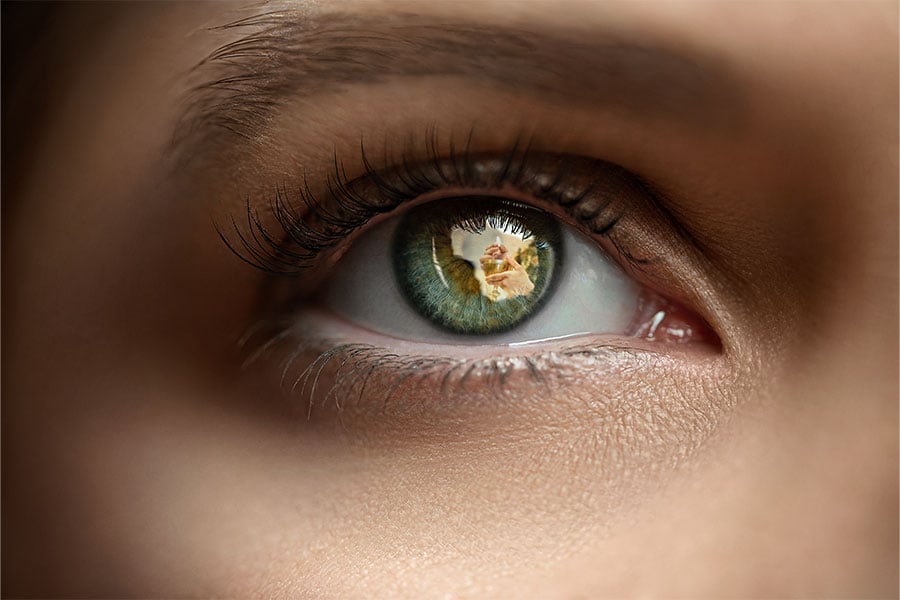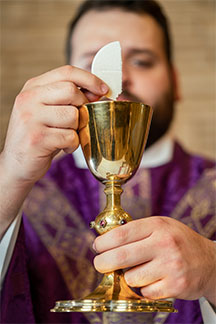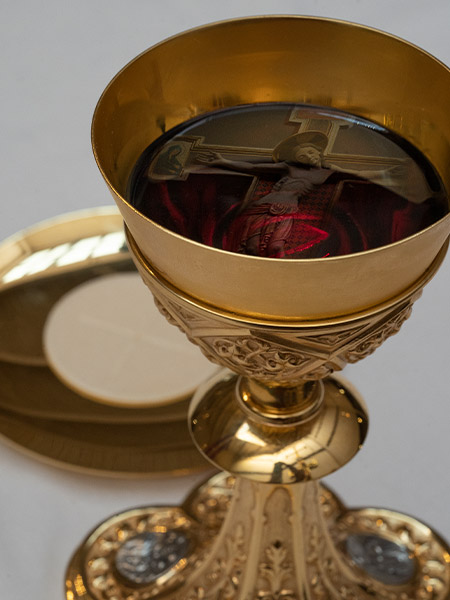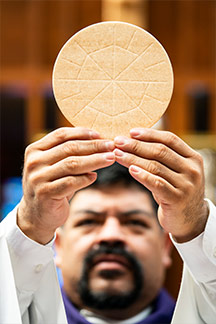With the eyes of faith: a look at the real presence of Christ in the Eucharist

Photo illustration by Juan Guajardo and Jillian Brearley
When Father Samuel Maul was a high school student, he wrestled with questions about the Eucharist. In his head, he knew the Catholic Church teaches that the Eucharist is the body and blood, soul and divinity, of our Lord Jesus Christ.
But he wanted to understand it; not just accept it on a superficial level. He thought, “If I want to be serious about my faith, then the Eucharist needs to become the central aspect of my life.”
He began attending daily Mass at St. Michael Parish in Bedford before school each morning, and he remembers staring at the Eucharist very intently and wondering, “What is this and who are you?”
After about a year, he heard God speak to him during the prayer of consecration, “If you want to understand these words, you need to say them.”
“That solidified my trajectory toward the priesthood … this journey to understanding who it is that Christ is and what it is that He has given us in the Eucharist, and how does He make Himself present to us,” he recalled.
Ordained to the priesthood on May 22, Fr. Maul smiled as he explained the Eucharist can’t really be completely understood, because it’s a mystery.
“Once you understand the Eucharist, you can never leave the Church. Not because the Church won’t let you, but because your heart won’t let you.”
St. Teresa of Kolkata (1910 -1997)
Founder of the Missionaries of Charity
Since the Last Supper, the Church has affirmed the real presence of Jesus Christ in the Eucharist. Scripture, centuries of writings of the saints, and the magisterium have held this mystery as central to our Catholic faith.
As Bishop Michael Olson said in his homily on the first Sunday of Advent, “In the Eucharistic prayer at every Mass, the heavens are opened, and God comes down. In Holy Communion the heavens are opened, and God comes down.”
Jesus, who gave Himself to us on the cross, gives Himself to us in the Body and Blood of Holy Communion at every Mass.
“We can’t grasp the entire reality of what it means to be part of the Eucharistic feast,” said Fr. Maul at a recent presentation on the Real Presence at St. John the Apostle Parish in North Richland Hills, where he serves as parochial vicar.

At the presentation, Fr. Maul explained that Jesus is present to us in all seven sacraments, in prayer, and in Scripture. When two or more are gathered in His name, Jesus promises He is with us. When the priest acts in persona Christi, in the person of Christ, by offering Mass, forgiving sins, and other acts of sanctification and guidance, Jesus is there.
“But He is so radically present to us in the Eucharist that the signs do not point to a deeper reality, rather, the signs themselves become the reality,” said Fr. Maul.
The Eucharist nourishes our life and places us in intimate Communion with Him and with one another.
In a November interview with EWTN anchor Raymond Arroyo, Bishop Olson said, “Precisely the whole point of being Catholic is that we receive the gift of the Eucharist that transforms us and makes us the Church. In the sense it calls every one of us to conversion, it enables us to respond to God’s grace, as God desires us to do, that we might decrease and He might increase.”
“Jesus does not demand great actions from us, but simply surrender and gratitude.”
St. Thérèse of Lisieux (1873-1897)
Carmelite nun and Doctor of the Church
Father John Robert Skeldon, rector of St. Patrick Cathedral, said it’s important to realize that God’s gifts — salvation, the Eucharist — can’t be earned.
“It’s completely unmerited, freely given, gratuitous. It’s a gift of God. I think that always has to be first and foremost in our minds in understanding our relationship to God, through which especially the sacrament of the Eucharist is so powerfully understood: the gift of God incarnate, Jesus Christ, giving of His body and blood for the sake of love, out of love for every single one of us, throughout time and throughout space.” he said.
Our response to the gift, Fr. Skeldon said, should follow the wisdom of St. Thérèse.
“Our responsibility, it seems to me, is our surrender — giving ourselves over to God — and our thankfulness.” Although it sounds simple, the priest admitted “which of course at the end of the day is everything.”
“What we receive, freely given, we in turn have to freely give away as well. So, we become a vessel, or a vehicle, a conduit of the grace received,” said the rector.
Fr. Skeldon has reflected on why the Gospel of John, unlike the other Gospels, does not include the institution of the Eucharist at the Last Supper but has the unique scene of Jesus taking on the role of a servant to wash the Apostles’ feet.

By the time St. John wrote his Gospel, the Eucharist would have been well established since the earliest Christians had been celebrating Mass for two generations. Fr. Skeldon posits that St. John described the foot washing to reinforce the meaning of the Eucharist.
“I think John is sort of interpreting ‘What does the Eucharist mean?’ And it’s this powerful, powerful portrayal of selfless service. And not counting the cost,” he said.
He continued, “What does the Eucharist mean? The Eucharist is this summons to entering into the fullness of the life of God in Christ, which is self-sacrificial love…. It’s a summons to ongoing conversion and transformation of life.”
“The Eucharist is my highway to heaven.”
Blessed Carlo Acutis (1991 – 2006)
Italian teen who created a website documenting Eucharistic miracles
When Jamahal Hamilton receives the Eucharist, he “feels like my faith tank has been filled for the day.”
The Holy Family parishioner entered the Church at the Easter Vigil service in 2021, after a period of spiritual searching that began with a life-threatening stroke.
At Mass, he listens to the Liturgy of the Eucharist and imagines he’s present at the Last Supper and Jesus is calling him to discipleship.
With his faith tank filled, the Knight of Columbus volunteers in the parish, in the community, and on the job. He drives for Uber and prays with many of his customers.
He said, “Before I joined RCIA, I didn’t understand what the Eucharist meant. After I got baptized, I understand what it means to Catholics. It’s a pretty big deal. God is present in the Eucharist. How else can we actually be that close to Jesus?”
He said, “God saved me. I have to give back because I receive this amazing thing.”
“For not as common bread and common drink do we receive these; … the food which is blessed by the prayer of His word, and from which our blood and flesh by transmutation are nourished, is the flesh and blood of that Jesus who was made flesh.”
St. Justin Martyr
(c. 100-165)
Early Church Father
Father Fernando Preciado claimed he could talk “hours and hours” about the Eucharist. “I would never finish about the Eucharist,” he said. “All that we are depends on this sacrament.”
The pastor of St. Francis Cabrini Parish in Granbury and St. Rose of Lima Parish in Glen Rose wants to share his devotion to the Blessed Sacrament. He encourages a few practices during Mass to more deeply appreciate this “best, most important food of the day.”
“Come early, take your time to pray in silence. Kneel before Jesus to say, ‘You are my everything. You are my Lord,’” said the pastor, who recommends attending daily Mass if possible.
According to Fr. Maul, after the priest or Eucharistic minister says, “The Body of Christ,” the faithful’s “Amen” should mean more than just, “I agree.” He explained, “Amen is a ‘yes’ to the life I’m being called to in the reception of this gift.”

Fr. Preciado added, “After you receive Communion, you are the most holy people. Not because you are, by yourself, but because you receive the body of Jesus Christ. How long the holiness is in our lives depends on you.”
Kneeling in sacred silence is important after Holy Communion, according to Fr. Preciado. “Jesus is not just in the tabernacle or on the altar, He’s in your body. It’s a time to hug Him and ask Him whatever you need and say to Him your worries.”
Fr. Maul added that Eucharistic Adoration is an extension of the Eucharistic celebration and gives “ample time for the Christian faithful to gaze upon the mystery of Christ’s love, with ample time to allow the mystery to penetrate our hearts.”
Last but not least, said Fr. Maul, is to go to Reconciliation. “Be in a state that’s ready to receive the heavenly gift…. We let go of our own selves in order to receive Christ in His totality.”
“Once you understand the Eucharist, you can never leave the Church. Not because the Church won’t let you, but because your heart won’t let you.”
St. Teresa of Kolkata (1910 -1997)
Founder of the Missionaries of Charity
According to an oft-cited 2019 Pew Research study, only 63 percent of Catholics who attend Mass weekly or more frequently believe that the bread and wine become the Body and Blood of Christ during the consecration.
Broaden the results to include all self-described Catholics, and just 31 percent believe in the real presence of Christ in the Eucharist.
Adding to this dismal situation is the decline in Mass attendance, which worsened during the first year of the coronavirus pandemic and still hasn’t completely recovered.
Fr. Maul thinks the decline in Mass attendance is not the problem — it’s the symptom. The root problem is a lack of understanding of the Mass and the Eucharist.
He said, “If people lived a year of their life without the Eucharist, and their lives didn’t change at all, and they didn’t feel the necessity to come back, what did they think the Mass was beforehand? And why was [the Eucharist] not the central aspect of their lives?”
Fr. Preciado estimated that attendance at his parishes is at about 70 percent of pre-pandemic levels. He said, “The Mass, for me, is the most, most beautiful gift we have in our lives. If the people understand what we have, they’ll be back.”
Perhaps those missing from Mass never knew or have forgotten the treasure available at every Mass. The same survey found that only 58 percent of weekly Mass-goers know Church teaching on transubstantiation.
The United States Conference of Catholic Bishops hopes to deepen the faithful’s understanding and belief in the doctrine of transubstantiation with a recent document, “The Mystery of the Eucharist in the Life of the Church,” and plans for a three-year Eucharistic revival.
Bishop Olson is a member of the USCCB committee on doctrine, which wrote the 31-page document which discusses the centrality of the Eucharist to the life of the Church.
The document was approved at the fall meeting of the U.S. bishops in November.
The bishops voted for a National Eucharistic Revival to begin on the Feast of Corpus Christ, June 16, 2022, and culminate with a national congress in Indianapolis on July 17-21, 2024.
They anticipate the revival will include events at the parish level, such as Eucharistic Adoration, processions, and teachings on the Eucharist. Regional revivals will follow, leading to the Eucharistic Congress in Indianapolis, a multi-day event modeled after World Youth Day.
In the interview with Arroyo, Bishop Olson expressed his hope that “The Mystery of the Eucharist in the Life of the Church” will “inspire in people a recognition of the need for the Eucharist that we have, that it transcends us.”
Furthermore, the bishop continued, by a national emphasis on the Eucharist, the faithful will realize “that [the Eucharist] is something that Christ gives us, His sacrifice, His very body, blood, soul, and divinity to transform us; that brings communion with Him, with the Trinity, and with our neighbor. It enables us to love as Christ loves.”
